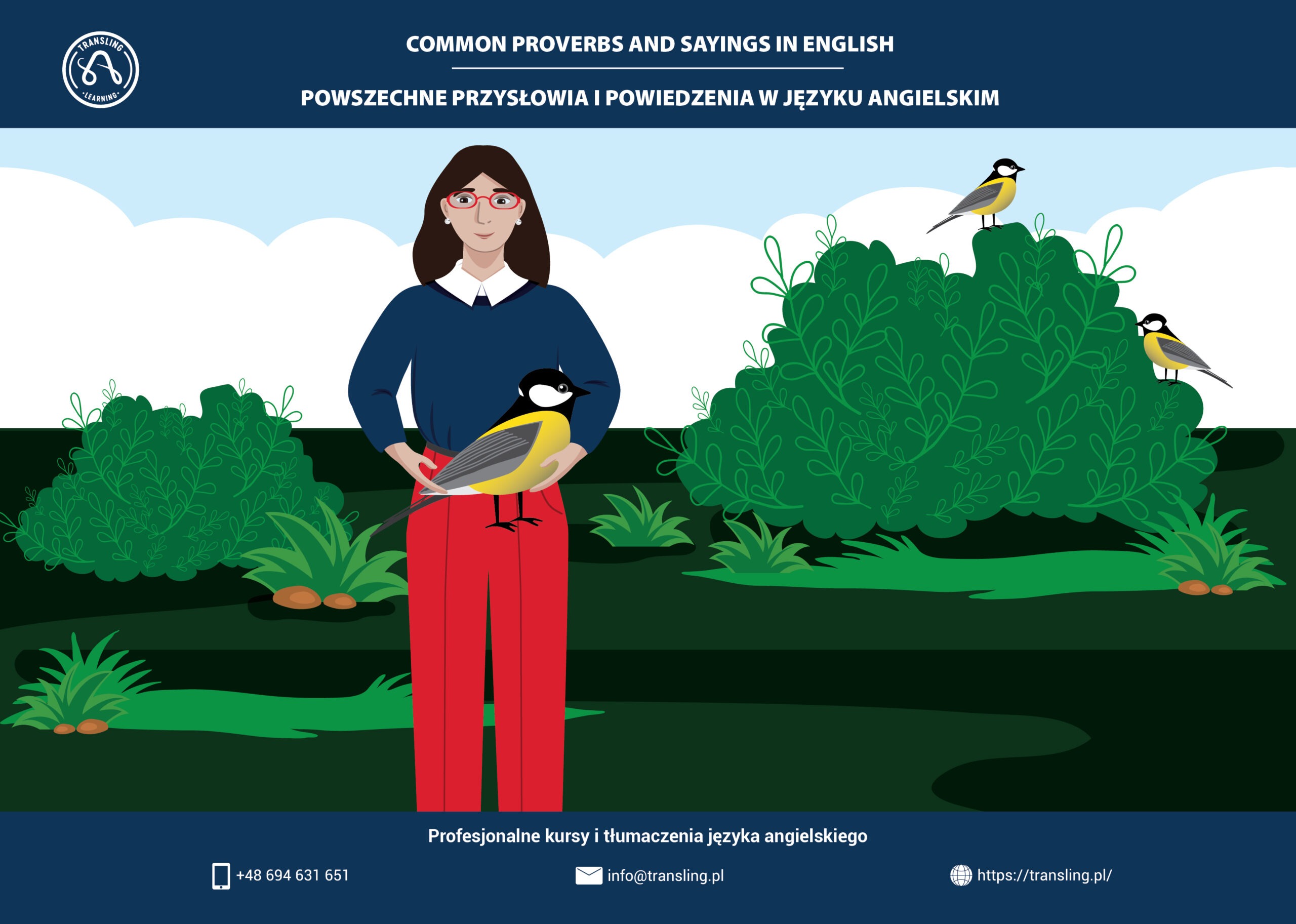Common proverbs and sayings in English
Powszechne przysłowia i powiedzenia w języku angielskim
Jak powszechnie wiadomo przysłowia i powiedzenia są swoistą mądrością danego narodu a ich znajomość pogłębia tylko naszą świadomość językową i leksykalną oraz pokazuje wysoki poziom opanowania słownictwa w danym języku. Bez wątpienia, znajomość kilku powszechnych i popularnych przysłów w języku obcym wzbogaci nasze umiejętności czy to w pisaniu czy czytaniu lub przy biernym słuchaniu a zastosowanie ich w języku mówionym na pewno ubogaci nasze konwersacje zarówno te codziennie, prozaiczne jak i bardziej wyrafinowane na szczeblu zawodowym.
Poniżej zestawienie 20 najbardziej znanych i często używanych przysłów stosowanych w języku angielskim wraz z objaśnieniami i ich odpowiednikami w języku polskim.
As is commonly known, proverbs and sayings are a kind of wisdom of a given nation and knowing them only deepens our linguistic and lexical awareness and demonstrates a high level of vocabulary mastery in a given language. Undoubtedly, knowing a few common and popular proverbs in a foreign language will enrich our skills, whether in writing or reading or even passive listening, and using them in spoken language will certainly enrich our conversations, both everyday and common ones as well as those which are more sophisticated, used at a professional level.
Below is a list of 20 most common and frequently used proverbs in English, along with explanations and their Polish equivalents.
A bird in the hand is worth two in the bush = said when you recognise that you should not risk losing something you already have by trying to get something you think might be better (lepszy wróbel w garści niż gołąb na dachu)
Birds of a feather flock together = said about people who have similar characters or interests, especially ones of which you disapprove, and who often spend time with each other (ciągnie swój do swego, być z tej samej gliny, dobrać się jak w korcu marku)

A leopard doesn’t / can’t change its spots = something you say that means a person’s character, especially if it is bad, will not change, even if they pretend that it will (natura ciągnie wilka do lasu)
You can’t teach an old dog new tricks = said to mean that it is very difficult to teach someone new skills or to change someone’s habits or character (przyzwyczajenie jest drugą naturą człowieka)
All work and no play makes Jack a dull boy = said to warn someone that they will not be an interesting person by working all the time (nie samą pracą żyje człowiek)
Don’t look a gift horse in the mouth = said to advise someone not to refuse something good that is being offered (darowanemu koniowi nie zagląda się w zęby)
Kill two birds with one stone = to succeed in achieving two things in a single action (upiec dwie pieczenie na jednym ogniu)
Don’t count your chickens before they’re hatched = you should not make plans that depend on something good happening before you know that it has actually happened (nie chwal dnia przed zachodem słońca, nie dziel skóry na niedźwiedziu)

One swallow doesn’t make a summer = used to say that because one good thing has happened, it isn’t certain that a situation is going to improve (jedna jaskółka wiosny nie czyni)
Don’t put all the eggs in one basket = don’t risk everything on the success of one venture (nie stawiaj wszystkiego na jedną kartę)
Too many cooks spoil the broth = said when there are too many people involved in trying to do the same thing, the final result won’t be good (gdzie kucharek sześć tam nie ma co jeść)
When in Rome, do as the Romans do = when you are visiting another place, you should follow the customs of the people in that place (kiedy wejdziesz między wrony, musisz krakać tak jak one)
Every Jack must have his Jill = everyone will eventually find their romantic partner (każda potwora znajdzie swego amatora)
The grass is always greener on the other side of the fence = something that you say that means that other people always seem to be in a better situation than you, although they may not be (dobrze tam gdzie nas nie ma)
People who live in glass houses shouldn’t throw stones = it means that you should not criticise other people for bad qualities in their character that you have yourself (przyganiał kocioł garnkowi, przyjrzyj się sobie zanim zaczniesz krytykować innych)
Don’t judge a book by its cover / Never judge a book by its cover = you shouldn’t judge the worth or value of someone or something only by looking at their outward appearance (nie oceniaj książki po okładce)

One man’s meat is another man’s poison = said to emphasise that people like different things; something which is good for one person might be bad or even pose a danger to another one (co dla jednego jest słodyczą, dla drugiego jest goryczą; co kraj, to obyczaj)
Strike while the iron is hot / Make hay while the sun shines = take advantage of the chance or opportunity while it lasts (kuj żelazo póki gorące)

Don’t make a mountain out of a molehill = don’t make the situation seem worse than it is, don’t cause something unimportant to seem important (nie rób z igły widły)
Actions speak louder than words = what you do is more important and shows your intentions and feelings more clearly than what you say (liczą się czyny a nie słowa)
EXERCISE
A teraz czas sprawdzić swą praktyczną znajomość powszechnych przysłów angielskich.
Do poniższych zdań/sytuacji dopasuj właściwe przysłowie lub powiedzenie zaprezentowane w powyższym materiale.
Now it’s time to test your practical knowledge of common English proverbs. Match the sentences/situations below with the appropriate proverb or saying presented above.
They are opening a new company branch in our city next week. I’m going to take the chance and apply for the job as soon as possible.
Peter likes eating meat for dinner while his girlfriends prefers a vegetarian dish.
Come on, get a life! You should do something more than spending all days and weekends at work.
You should be grateful for what you got for birthday instead of complaining.
He always thinks his friends and neighbours have a better life than him.
I wouldn’t risk applying for just one job; it’s better to send a few applications to increase the chance.
My supervisor is always making a big problem out of a small thing.
If we leave early, we will manage to catch the first train and we will also have enough time to avoid the morning rush hour.
Just because your boss recognised your new project doesn’t necessarily mean you will get promoted soon.
Only because she is still single doesn’t mean she won’t ever find a partner.

